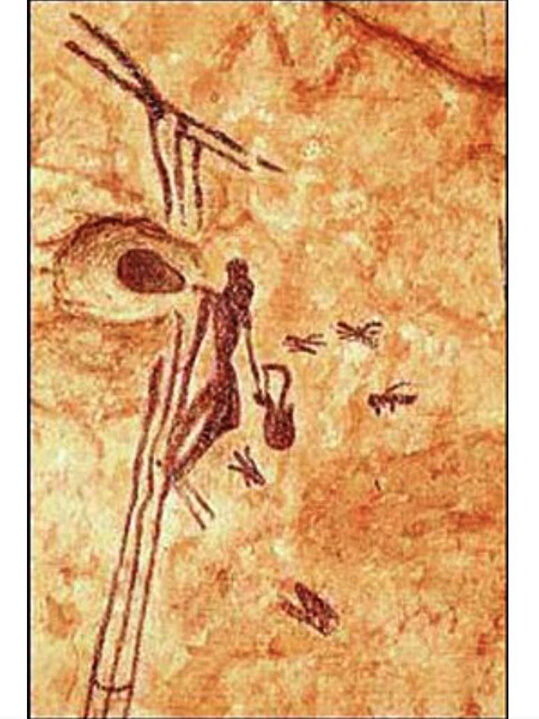Welcome back to this series where we explore bees and honey throughout history. This month, we travel back in time to ancient Greece.
Beekeepers and all who eat honey, burn beeswax candles or enjoy any other bee-related product owe a debt of gratitude to Aristaeus. Aristaeus was a minor but well-loved god because he was the god of delicious, practical pursuits like dairy farming and beekeeping, and he chose to share his knowledge with humankind of how to tame bees and harvest their treasures. Thank you, Aristaeus!
He was a devoted beekeeper, demonstrated in what is perhaps the most shared story about him. You may know the tragic tale of the love between the Greek hero Orpheus and the nymph Eurydice. When Eurydice died, Orpheus travelled to the underworld to bring her back to life. Did you know that it was all Aristaeus’s fault that she died? Orpheus and Eurydice were deeply in love, so when Aristaeus made romantic advances towards her, Eurydice fled. While attempting to evade him, she was bitten by a poisonous snake and the venom killed her. The outcome for the besotted couple is irrelevant since our interest is in bees and honey. What we care about is the aftermath for Aristaeus. Since Orpheus had lost his love, Aristaeus’s love was taken from him as punishment: his bees died! Distraught, he sought advice and learned that he must make animal sacrifices to Eurydice’s spirit. So, that’s just what he did. When he returned to the animal carcasses some days later, he discovered a swarm of bees and was able to resume beekeeping! A happy ending!
We now know the Greek mythology behind beekeeping, but the ancient Greeks also taught us a lot of the science.
Another notable Greek figure in bee history is the philosopher Aristotle. Calling him only a philosopher feels like I’m doing him a disservice since he was an intellectual giant who contributed to many disciplines including logic, politics, metaphysics and poetry. Perhaps it is more suitable to borrow Dante’s title for him: “the master of those who know”. Amongst Aristotle’s vast works is foundational knowledge on bee society, which he discovered by observing bees.
- He learned that there are three types of bee: workers, drones and one sovereign bee. However, perhaps influenced by the patriarchal society he lived in, he assumed it was a king bee rather than a queen.
- He recognised that baby bees develop inside cells and emerge as grown bees.
- He noticed that bees are foragers who gather resources from flowers.
- He identified that bees work collaboratively, fulfilling different roles, such as guarding and constructing cells, to achieve a unified goal.
I think it’s fair to say that apiculture wouldn’t exist without these essential facts to build upon!
We’ve got one last Greek legend to discuss: Hippocrates. Aristotle developed our scientific knowledge of bees, while Hippocrates was interested in the scientific application of honey! The ‘father of medicine’ incorporated honey into his practise to treat all manner of ailments, including pain, burns and ulcers. Honey was also abundant in the diets of the healthy to promote good health and vigour!
Bees and honey were clearly adored by the people of ancient Greece!
